#he has already been quoting out of context bits i've shown him
Text
So my husband was just like, "I was thinking for our anniversary we could go eat somewhere early, then you could make me watch one of your shows the rest of the day if you want"
It's finally fucking go time
#bless this man he gets me#i did check like five times to make sure he actually wanted to btw#he watched two episodes in 2019 and always meant to pick it back up anyway#he has already been quoting out of context bits i've shown him#'slither over and watch you eat cake' and 'just an angel i know' are said daily by both of us#anyway excuse me while i excitedly vibrate until next monday#when we can be dumb and gay and make jokes about them banging all day#i officially need a personal tag so:#jay's nonsense#block that if you want idc#also for my own purposes:#mark adventures
0 notes
Text
I'm just adding my voice to the growing choir but yeah, I don't think Trent is going to out Collin:
It would be an extreme moment of regression. I mean, this guy gave up decades of high-profile journalism due to his distaste for how the job was making him compromise his ethics. He's not gonna just turn around and out a player after that.
(Headcanon-y side-note, but Trent is HEAVILY queer coded and based on my personal readings of his character he's someone who would not just respect Collin, but understand him.)
I've been noticing that each episode has a small "Don't print that" moment where Trent seems legitimately open to keeping the club's personal secrets. The ones that, frankly, have no bearing on football and thus the public has no right to them (changing manicurists, diarrhea, etc.) None of these scenes have implied that he's merely humoring his worried friends and planning to air all the dirty laundry when they're least expecting it. A player kissing another man in an alley on their night off absolutely counts as 'Personal and none of the book's business.'
Outside of the book, how would Trent publish this? He doesn't seem to be doing freelance. It's possible he could pass the tip off to someone else, but we haven't seen any journalist buddies he's friendly with and giving that to a stranger (from the audience's perspective) would feel like even more of a betrayal. You're not just outing him, but using someone who we can't trust to spin the story in an empathetic light, as Trent did with Ted's panic attacks?
Trent doesn't snap a photo of them, despite having the time to get one (they're oblivious). He doesn't write anything in his notebook. He doesn't interrupt and hound them for a quote like he might have in season 1-2. He just walks off, looking contemplative/a bit worried.
So I don't think Trent is going to out Collin, but I do think he might try and do something about it. Meaning, this episode has shown that Collin is, well... pretty bad at keeping his sexuality a secret. He's sneaking out of his boyfriend's house, trying not to draw attention to himself, but then he hits a whole bunch of trash cans while leaving. I got a huge spike of anxiety when he looked at his phone with the other guys standing right there, given that a selfie, kissy emoji, and "thirst" are all pretty damning texts. He's obviously kissing right next to the main road, just a street or so down from where half the club is eating dinner, in a remarkably lit area. And though he tries to deflect a lot - fine he's gay for Zava too, this is my wingman, story about trying to seduce women - it comes across as trying too hard to anyone who's paying attention. Because, you know, Collin is trying very hard, despite his missteps.
The point is that Collin is constantly on the cusp of being outed. If the story doesn't have that happen next episode (that would put a damper on Richmond's win streak) I think Trent is going to step in somehow in an effort to provide damage control - or at least try to, even if he winds up being too late. The use of "Everybody Knows," while obviously a pertinent title, is also a list of how all these awful things have already come to pass - "That's how it goes" - and contains such gems as,
"Everybody knows you've been discreet
But there were so many people you just had to meet
Without your clothes
Everybody knows"
(The context here is cheating, but for a background snippet of a song I think the general vibe of bad things + lovers + not being discreet wins out.)
So Trent may try to step in, even if it comes to naught. After all, if he spotted them it's only a matter of time until someone else does too. Collin is lucky it was Trent who saw them and not someone else.
Cue the emphasis on how much he's changed as a journalist (Collin wouldn't have been lucky a year ago), viewers get a cool new relationship between characters who haven't interacted yet, as well as the canonizing of Trent as a queer man without giving him a coming out story because frankly a 50ish character doesn't (necessarily) need that. He's already got the "vibe" 🌈😎
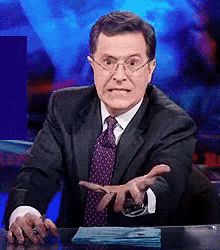
#Ted Lasso#Ted Lasso spoilers#Trent Crimm#long post#for the record I have complete faith in this show not to fuck this up#WITH THE CAVEAT#that the Sam/Rebecca situation has always made me go '?????'#like that's the one time Ted Lasso has induced a 'Hey wtf' response#and I remain hopeful that it was a one time thing
105 notes
·
View notes
Note
Hey Sinaya! Seeing you talk about BrBa and BCS has definitely intrigued for a good while now and I have been considering watching a few episodes to see if I like it. However, the topic of cancer is A Lot for me and I was wondering how deep that is entertwined with both shows. I know that's why Walter decides to start making meth, so does it fade in time or is it constantly mentioned? Thanks! (you can answer publicly if u want for other ppl to know what to expect I don't personally mind :>)
i can answer this a bit more easily with BCS. in BCS, it's hardly mentioned—really only once very late in the show, and not super touched upon. (in a more script analysis way i think it was just want to illustrate a connection from the character who has it to walter + to illustrate another major character's "humanity" with how they react to this information.)
in BRBA it's mainly used more as a narrative device. in earlier episodes of the show walter is shown getting his diagnosis, and then later episodes show him getting treatment (chemo), and there's some talks about/relating his cancer, but it's mostly used to be the ticking time bomb element to the story.
(less vague/more spoilery/detailed kind of explanation below the cut, but i'll try not to spoil anything irrelevant)
cancer is usually brought up in three main ways in the show in relation to walter: 1) as the actual condition he's diagnosed with, 2) as a driving/motivational force for him, and 3) as, to quote someone else, a device that puts him in imminent death.
i've already mentioned #1 but they don't go much in detail with this aspect, i think. if your concern is about the more medical side of the experience, walter gets his diagnosis, and after he decides to get chemo, there's a few doctors' appointments here and there and some moments of him getting his treatment. but nothing too detailed nor medical procedures-heavy imo. 'course i'm not the best person to ask how much it hits close to home since i've not had to deal with it myself, but from what i've seen other people say it's like. the usual stuff where they've clearly paid enough attention but it's still not really a serious deep dive into what living with cancer or someone with cancer is like. the most we see of walter's struggle with it is his coughing fits, and some moments during the earlier episodes when he starts taking his treatment. (some people have commented on how unrealistic his energy levels are.)
and it's because it's treated more of a narrative device, like i said. #2 and i guess #3 too are the basic premise of the show—walter mentions his cancer multiple times in terms of how he's realized he's probably gonna die soon and HAS to figure out a way to make sure he doesn't leave his family with nothing when he does. there's more of a talk about walter's morality here than the cancer itself. (idk where to put this extra info but i wanna add that walter's cancer is put into remission and he no longer has a life sentence hanging over his head, at least for the moment, it becomes a way to illustrate how much walter is being driven by forces other than his need to provide for his family. aka his ego and shit.)
another important thing i have to mention is the way they "moralize" cancer in the show. ofc in real life anyone can be diagnosed with it and it has no bearing on whether or not a person is "bad" and "deserves" it. the show mostly doesn't try to moralize cancer, either. the only times it might come off like it does is when other characters around walt are being negatively affected by him and wish for him to just die already, or wish for "the cancer to come back". i don't think we're meant to take this as the show's thesis statement about how cancer is a punishment or something, since these remarks were made by characters in stressful, emotionally heightened situations. i don't think it happens often enough outside of this context to be treated like a core theme of the show. morality, like i mentioned, maybe. but themes about terminal illness being a sort of karmic punishment? nah, not really.
i hope this is helpful and clear and not just word vomit!
#this is ok to rb in case someone else disagrees or wants to expand on what i said here#putting this in the brba tag also in case someone might wanna add their two cents#breaking bad#brba#cancer#op#asks#goldieclaws#not super helpful just me rambling but ive been thinking abt that last point i brought up for a while actually.#one of the posts i wanted to make after finishing brba was an analysis of if and possibly how the show treated walter's cancer in terms#of moralizing it but i never got around to it#but yeah i don't think they really do that. at least‚ it didn't come off like that to me.
2 notes
·
View notes
Text
My thoughts on ch. 139
Some of you may be familiar with my previous writings - I usually try to stay as collected as possible, but today's post will be different. Ever since the chapter came out, I've been reblogging a lot of rants and memes about it. Those of you who follow my blog (thank you so much, really happy to have you here! ❤) know that I didn't really enjoy this ending. I want to elaborate more on that in this post - my only advice is to buckle up, because today we may get a bit heated (I apologize in advance for the sassy approach - I usually try to stray away from that, but guess today's post is more of a stream of conciousness/rant) :'D
1. Ymir
Starting up with one of the most controversial things about this chapter. Up to this point, I felt really bad for Ymir. Her life was terrible - she was a young girl, who was enslaved and abused by king Shitz Fritz. After she was forced to run away from his hounds, she acquired the power of titans and used it to help the king's cause. For that, she was awarded with the king's seed (🤢), and eventually became a mother of three girls. Through her entire life, she was treated as a slave and a lesser-being by the king - she also died while protecting him, and her daughters were forced to eat her remains after that (🤢🤢).
It felt so tragic to see her 2000 years later, still walking blindly in the paths. It wasn't enough that she was hurt so badly when she was still alive - she remained enslaved to the abusive king even after she died. I was rooting for her to finally be freed from this nightmare - hence I was so happy when ch. 122 came out and we got this scene:

I was genuinely emotional when I saw her reaction. Finally, someone expressed some authentic care for her and tried to snap her out of this blind state. She would finally think about what she wants and try to free herself from the paths because, as Eren said, she was never a slave or a goddess - just a regular person. It's just like she finally let out all the pain that she's been suppressing for all these years.
Yeah...except, as it turns out, her awakening here changes nothing. She doesn't come to any conclusions, like, perhaps, that she doesn’t want to let herself be hurt and mistreated any longer...or that she should fight for herself, try to change her fate - because, after all, her life belongs to her - not anyone else.
Nothing like this happens. Why? Because, as it turns out, she's in love with king Fritz and needs to be proven by Mikasa that she can break this bond first.
....
💀💀💀💀
Excuse me, but...what?
Okay, first and foremost...am I supposed to believe that, during these 2000 years, no one else has gone against their unhealthy affection to someone toxic and unworthy of their love? No one? 🤡 Come on, we even saw that happen in the manga. What about Historia, who thought that her own mother hitting her was a sign of love? Who wanted to believe that her father was good, despite wanting to turn her into a titan? Where was Ymir when Historia stood up for herself against her father's wishes? Or when she flew up to him and delivered the final blow against him?
On top of that...what a disappointing conclusion to Ymir's story. I hoped that she would take her fate into her own hands, and - for example - be reborn and experience life as a free person, surrounded by people who actually care about her. Free herself from paths and destroy it - not because someone shows her that she can indeed detach herself from it, but simply because she wants to.
Instead, 80% of the world population is gone, because she needed to see that Mikasa is able to "free" herself from Eren in order to do the same.
🤡🤡🤡
2. Abandoned plotlines and plot-holes
Mikasa being a Hizuru princess? Never heard of that. Hallucigenia's fate? Who cares. Eren directing Dina's titan in Carla's direction in order to save Berthold? Nah, who would want any more info on that - guess he just couldn't direct her anywhere else. The Ackerman's headaches? Pfff. The fact that Mikasa shouldn't be affected by the memory altering, but somehow still is in the ending? "I guess she just forgot that she should be immune to this". Why was Historia's pregnancy implied as relevant if it wasn't in the end? So many precious panels wasted on that, when they could be used to help solve some other "unanswered questions" instead. Ehhh...🤷
3. Blatant character assassination
There, I'm saying it once again. I have no idea what happened in this chapter but the characters are off. What about Eren - the one who has always believed that freedom was his birthright, and has been fighting and moving forward for his goals? Yeah, turns out he has no idea why he was doing all of that.
Remember Kenny's quote - everyone is a slave to something? I thought that this implication was pretty poetic in context of Eren's character. Through all his life, he sought freedom, but ironically, he was a slave to that dream...
...turns out it may have been a bit too poetic for this story because Eren is a slave to destiny. Literally - he's going on auto-pilot in order to reach that one moment in which Mikasa beheads him, so Ymir can watch and understand that she can do the same.
Nice joke...except not. Here go our main character's motivations 🗑
He casually commits unjustifiable crimes against humanity - not because he wants to be free or because he found the world beyond the walls disappointing, (...as we were led to believe). He did that because he doesn't know why - and then, he cries that he doesn't want Mikasa to ever find another guy.
:'))
Turns out Eren was somehow always in love with her too...? Yeah, weird way of showing it. Or should I say - not showing it at all.
If you read my previous writings, you know that I'm not very fond of Eremika. The way I interpreted it while reading the story: it was unhealthy, suffocating and one-sided. I hoped for Mikasa to move on and start thinking about herself for once.
Right, what about Mikasa? Has she finally moved on? Is she content with her life? Are her dreams coming true? What's her daily life after all this? Sadly, I don't have the answers. The thing we are shown instead, is how she's sitting next to Eren's grave and, once again, thanking him for wraping the scarf around her. The only thing that implies that she may be somehow still seeing other people is one bubble of text. After all 139 chapters of hoping for her character developement, that's it.
Keep in mind that all other characters are shown together - with their spouses, families and friends - yet Mikasa is still separated and alone. That's right - after she disappears with Eren's head, she's not shown with anyone else until the end of the manga.
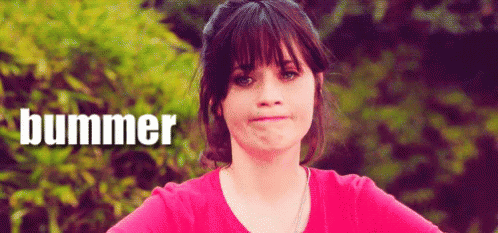
While we're on the topic of others, too...do I have to talk about the scenes in which everyone shows some level of gratitude to Eren...for wiping 80% humanity for them? Because I have no words for this.
One last note: I found the humor to be slightly out of place, too. Seriously, after all these terrible events, with so many unanswered questions and character developement of these two...Reiner is still weirdly simping for (now married) Historia and Jean is called a horse face :') Idk, but it feels somehow surreal after everything that's happened.
4. Conclusion
What else can I say...the final chapter disappointed me and I'm pretty sad about it. I'm happy for the people who liked it, but also can't help but feel like it was very far from perfect. I've been following SnK ever since 2013 and it's a bittersweet moment for me. The series had a lot of amazing moments that I'll definitely remember forever. Meanwhile, I would like to read some of the author's thoughts about the way he chose to end the story - perhaps it would clear some confusion (...although I can't help the fact that my first opinion is already formed).
Thank you very much for reading my thoughts - as always, it means a lot to me! ❤ The images used in this post are obviously not mine!
#snk 139#aot 139#snk spoilers#snk manga spoilers#snk ending#anti eremika#eren jeager#mikasa ackerman#ymir fritz#historia reiss#snk meta
174 notes
·
View notes
Text
the many faces of tom riddle, part 4
-attachment, orphanages, and yet more child psych: time to add yet another voice to the void-
FULL DISCLAIMER THAT THIS IS JUST MY OPINION OF A CHARACTER WHO DOESN’T HAVE THE STRONGEST CANON CHARACTERIZATION, AND THUS ALL THIS IS BASED ON MY CONCEPTUALIZATION.
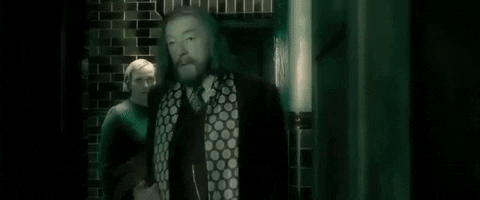
I'm going to be super biased, because my favorite portrayal of Tom Riddle is actually Hero Fiennes-Tiffin as eleven-year-old Tom Riddle, in HBP and I get to chat about child psych in this one, sooo here we go.
First of all, I’m just so impressed that a kid could bring that much depth to such a complex character.
This is the portrayal, I feel, that brings us closest to Tom’s character. Yes, Coulson’s brought us pretty close, but by fifth year, the mask was on.
We don't really get to see Tom looking afraid very often, but it's fear that rules his life, so it's really poignant in our first (chronologically) introduction, he looks absolutely terrified.
The void being the fandom's loud opinions on a certain headmaster. I wouldn't call myself pro-Dumbledore, but I'm certainly not anti-Dumbledore, either. (Agnostic-Dumbledore??)
Since I'm not of the anti-Dumbledore persuasion, I decided to poke around in the tags and see what the arguments were, so I don't make comments out of ignorance.
Most of the tag seems to be more directed towards his treatment of Harry and Sirius, but a few people mentioned that Dumbledore should have treated Tom with ‘exceptional kindness’ and tried to ‘rehabilitate’ him.
As I said in Parts 2 and 3, I am 100% in favor of helping a traumatized kid learn to cope, and I don’t think Tom Riddle was solidly on the Path to Evil (TM) at birth, or even at eleven. Not even at fifteen.
Could unconditional love and kindness have helped Tom Riddle enough for the rise of Lord Voldemort to never happen? Possibly, but...
Yes, I'm about to drag up that Carl Jung quote, again.
“I am not what happened to me, I am what I choose to become.”
The problem with this is that if you’re going to blame Dumbledore for this, you also have to blame every other adult in Tom’s life: his headmaster, Dippet, his Head of House, Slughorn, his ‘caretakers’ at the orphanage, Mrs. Cole and Martha, and possibly more. In fact, if we're going to blame any adult, let's blame Merope for r*ping and abusing Tom Riddle Senior, and having a kid she wasn't intending to take care of.
Furthermore, you cannot possibly hold anyone but Tom accountable for the murders he committed. (I should not have to sit here and explain why cold-blooded murder is wrong.) And if you like Tom Riddle's character, insinuating that his actions are completely at the whim of others is just a bit condescending towards him. He's not an automaton or a marionette, he's a very intelligent human being with a functioning brain, and at sixteen is fully capable of moral reasoning and critical analysis.
I've heard the theories about Dumbledore setting the Potters up to die, and I'm not going to discuss their validity right now; but he didn't put a wand in Tom's hand and force him to kill anyone. Tom did it all of his own accord.
And while yes, I have enormous sympathy for what happened to Tom as a child, at some point, he decided to murder Myrtle Warren, and that is where I lose my sympathy. Experiencing trauma does not give you the right to inflict harm on others. Yes, Tom was failed, but then, he spectacularly failed himself.
We also have no idea how Dumbledore treated Tom as a student.
In the movies, it’s Dumbledore who tells Tom he has to go back to the orphanage, but in the books, it’s Dippet. We know that Slughorn spent a lot of time around Tom at Slug Club and such, yet I don’t really see people clamoring for his head.
I regard the sentiment that Dumbledore turned Tom Riddle into Lord Voldemort with a lot of skepticism.
But let's hear from the character himself -- his impression of eleven-year-old Tom Riddle.

“Did I know that I had just met the most dangerous Dark wizard of all time?” said Dumbledore. “No, I had no idea that he was to grow up to be what he is. However, I was certainly intrigued by him. I returned to Hogwarts intending to keep an eye upon him, something I should have done in any case, given that he was alone and friendless, but which, already, I felt I ought to do for others’ sake as much as his."
Now, assuming that Dumbledore's telling the truth, I'm not seeing something glaringly wrong with this. No, he hasn't pigeonholed Tom as evil, yes, I'd be intrigued, too, and it's a very good idea to keep an eye on Tom, for his own sake.
“At Hogwarts,” Dumbledore went on, “we teach you not only to use magic, but to control it. You have — inadvertently, I am sure — been using your powers in a way that is neither taught nor tolerated at our school."
Again, it seems like he's at least somewhat sympathetic towards Tom, and is willing to at least give him a chance.
More evidence (again, assuming Dumbledore is a reliable narrator):
Harry: “Didn’t you tell them [the other professors], sir, what he’d been like when you met him at the orphanage?”
Dumbledore: “No, I did not. Though he had shown no hint of remorse, it was possible that he felt sorry for how he had behaved before and was resolved to turn over a fresh leaf. I chose to give him that chance.”
Now, I think Dumbledore is pretty awful with kids, but I don't think that's malicious. Yeah, it's a flaw, but perfect people don't exist, and perfect characters are dead boring. I am not saying that he definitely handled Tom's case well, I'm just saying that there's little evidence that Dumbledore, however shaken and scandalized, wrote him off as 'evil snake boy.'
It's also worth taking into account that it's 1938, and the attitudes towards mental health back then.
Why is Tom looking at Dumbledore like that, anyway? Why is he so scared? What has he possibly been threatened with or heard whispers of?
"'Professor'?" repeated Riddle. He looked wary. "Is that like 'doctor'? What are you here for? Did she get you in to have a look at me?"
"I don't believe you," said Riddle. "She wants me looked at, doesn't she? Tell the truth!"
"You can't kid me! The asylum, that's where you're from, isn't it? 'Professor,' yes, of course -- well, I'm not going, see? That old cat's the one who should be in the asylum. I never did anything to little Amy Benson or Dennis Bishop, and you can ask them, they'll tell you!
Tom keeps insisting he's not mad until Dumbledore finally manages to calm him down.
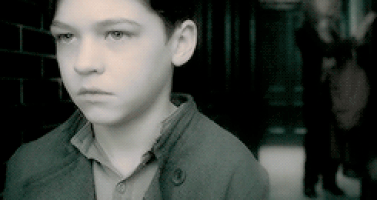
I'm really upset this wasn't in the movie, because it's important context. Instead we got these throwaway cutscenes of some knick-knacks relating to the Cave he's got lying around, but I just would have preferred to see him freaking out like he does in the book.
There was extreme stigma and prejudice towards mental illness.
'Lunatic asylums,' as they were called in Tom's time, were terrible places. In the 1930s and 40s, he could look forward to being 'treated' with induced convulsions, via metrazol, insulin, electroshock, and malaria injections. And if he stuck around long enough, he could even look forward to a lobotomy!
So, if you think Dumbledore was judgmental towards Tom, imagine how flat-out prejudiced whatever doctors or 'experts' Mrs. Cole might have gotten in to 'look at him' must have been!
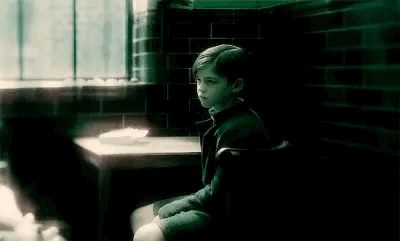
Moving on to the next few shots, he is sitting down and hunched over as if expecting punishment or at least some kind of bad news, Dumbledore is mostly out of the frame. He’s trapped visually, by Dumbledore on one side, and a wall on the other, because he’s still very much afraid. uncomfortable, as he tells Dumbledore a secret that he fears could get him committed to an asylum (which were fucking horrible places, as I said).
It brings to the scene that miserable sense of isolation and loneliness to that has defined Tom’s entire life up to that point (and, partially due to his own bad choices, continues to define it).
And, when Dumbledore accepts it, his posture changes. he becomes more confident and more at ease, as he describes the... utilities of his magical abilities.
"All sorts," breathed Riddle. A flush of excitement was rising up his neck into his hollow cheeks; he looked fevered. "I can make things move without touching them. I can make animals do what I want them to do, without training them. I can make bad things happen to people who annoy me. I can make them hurt if I want to."
Riddle lifted his head. His face was transfigured: There was a wild happiness upon it, yet for some reason it did not make him better looking; on the contrary, his finely carved features seemed somehow rougher, his expression almost bestial.
I do think Harry, our narrator, is being a tad bit judgmental here. Magic is probably the only thing that brings Tom happiness in his grey, lonely world, and when I was Tom's age and being bullied, if I had magic powers, you'd better believe that I'd (a) be bloody ecstatic about it (b) use them. And, like Tom, I can't honestly say that I can't imagine getting a bit carried-away with it. Unfortunately, we can't all be as inherently good and kindhearted as Harry.
Reading HBP again, as a 'mature' person, it almost seems like the reader is being prompted to see Tom as evil just because he's got 'weird' facial expressions.
So... uh...
Nope, let's judge Tom on his actions, not looks of 'wild happiness.'
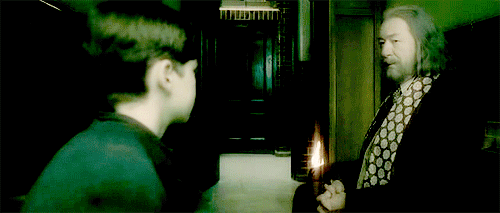
To his great surprise, however, Dumbledore drew his wand from an inside pocket of his suit jacket, pointed it at the shabby wardrobe in the corner, and gave the wand a casual flick.
The wardrobe burst into flames.
Riddle jumped to his feet; Harry could hardly blame him for howling in shock and rage; all his worldly possessions must be in there. But even as Riddle rounded on Dumbledore, the flames vanished, leaving the wardrobe completely undamaged.
Okay, one thing I dislike is Tom's lack of emotional affect when Dumbledore burned the wardrobe, in the books, he jumped up and started screaming, instead of looking passively (in shock, perhaps?) at the fire. Incidentally, I can't really tell if he's impressed or in shock, to be honest. I think they really tried to make Tom 'creepier' in the movie.
This is one of the incidents where Dumbledore's inability to deal with children crops up.
I think he was trying to teach Tom that magic can be dangerous, and he wouldn't like it to be used against him, but burning the wardrobe that contains everything he owns was a terrible move on Dumbledore's part. Tom already has very limited trust in other people, and now, he's not going to trust Dumbledore at all -- now, he's put Tom on the defensive/offensive for the rest of their interaction, and perhaps for the rest of their teacher-student relationship.
Riddle stared from the wardrobe to Dumbledore; then, his expression greedy, he pointed at the wand. "Where can I get one of them?"
"Where do you buy spellbooks?" interrupted Riddle, who had taken the heavy money bag without thanking Dumbledore, and was now examining a fat gold Galleon.
But I'm not surprised Tom is 'greedy.' He's grown up in an environment where if he wants something, whether that's affection, food, money, toys, he's got to take it. There's no one looking after his needs specifically. I'm not surprised that he's a thief and a hoarder, and I don't think that counts as a moral failing necessarily, and more of a maladaptive way of seeking comfort. It would be bizarre if he came out of Wool's Orphanage a complete saint.
Additionally, I think given that the Gaunt family has a history of 'mental instability,' Tom is a sensitive child, and the trauma of growing up institutionalized and possibly being treated badly due to his magical abilities or personality disorder deeply affected him.
And there are points where it seems that Dumbledore is quick to judge Tom.
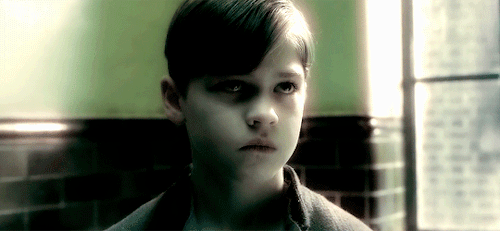
"He was already using magic against other people, to frighten, to punish, to control."
"Yes, indeed; a rare ability, and one supposedly connected with the Dark Arts, although as we know, there are Parselmouths among the great and the good too. In fact, his ability to speak to serpents did not make me nearly as uneasy as his obvious instincts for cruelty, secrecy, and domination."
"I trust that you also noticed that Tom Riddle was already highly self-sufficient, secretive, and, apparently, friendless?..."
And while this is all empirically true, these are (a) a product of Tom's harsh environment, and (b) do not necessarily make him evil. But the point remains that child psych didn't exist as a field of its own, and psychology as a proper science was in its infancy, so I'd be shocked if Dumbledore was insightful about Tom's situation.
But I've gone a ton of paragraphs without citing anything, so I've got to rectify that.
Let's talk about Harry Harlow's monkey experiments in the 1950-70s.
If you're not a fan of animal research, since I know some people are uncomfortable with it, feel free to scroll past.
Here's the TL;DR: Children need to be hugged and shown affection too, not just fed and clothed, please don't leave babies to 'cry out' and ignore their needs because it's backwards and fucking inhumane. HUG AND COMFORT AND CODDLE CHILDREN AND SPOIL THEM WITH AFFECTION!
I will put more red writing when the section is over.
This is still an interesting experiment to have in mind while we explore the whole 'no one taught Tom Riddle how to love' thing and whether or not it's actually a good argument.
Andddd let's go all the way back to the initial 1958 experiment, featured in Harlow's paper, the Nature of Love. (If you're familiar with Maslow's Hierarchy of Needs, him and Harlow actually collaborated for a time).
To give you an idea of our starting point, until Harlow's experiment, which happened twenty years after Dumbledore meets Tom for the first time, no one in science had really been interested in studying love and affection.
"Psychologists, at least psychologists who write textbooks, not only show no interest in the origin and development of love or affection, but they seem to be unaware of its very existence."
I'm going to link some videos of Harry Harlow showing the actual experiment, which animal rights activists would probably consider 'horrifying.' It's nothing gory or anything, but if you are particularly soft-hearted (and I do not mean that as an insult), be warned. It's mostly just baby monkeys being very upset and Harlow discussing it in a callous manner. Yes, today it would be considered unethical, but it's still incredibly important work and if you think you can handle it, I would recommend watching at least the first one to get an idea of how dramatic this effect is.
Dependency when frightened
The full experiment
The TL;DW:
This experiment was conducted with rhesus macaques; they're still used in psychology/neuroscience research when you want very human-like subjects, because they are very intelligent (unnervingly so, actually). I'd say that adult ones remind me of a three-year old child.
Harlow separated newborn monkeys from their mothers, and cared for their physical needs. They had ample nutrition, bedding, warmth, et cetera. However, the researchers noticed that the monkeys:
(a) were absolutely miserable. And not just that, but although all their physical needs were taken care of, they weren't surviving well past the first few days of life. (This has also been documented in human babies, and it's called failure to thrive and I'll talk about it a bit later).
(b) showed a strong attachment to the gauze pads used to cover the floor, and decided to investigate.
So, they decided to provide a surrogate 'mother.' Two, actually. Mother #1 was basically a heated fuzzy doll that was nice for the monkeys to cuddle with. Mother #2 was the same, but not fuzzy and made of wire. Both provided milk. The result? The monkeys spent all their time cuddling and feeding from the fuzzy 'mother.' Perhaps not surprising.
What Harlow decided next, is that one of the hallmarks being attached to your caregiver is seeking hugs and reassurance from them when frightened. So, when the monkeys were presented with something scary, they'd go straight to the cloth mother and ignore the wire one. Not only that, but when placed in an unfamiliar environment, if the cloth mother was present, the monkeys would be much calmer.
In a follow-up experiment, Harlow decided to see if there was some sort of sensitive period by introducing both 'mothers' to monkeys who had been raised in isolation for 250 days. Guess what?
The initial reaction of the monkeys to the alterations was one of extreme disturbance. All the infants screamed violently and made repeated attempts to escape the cage whenever the door was opened. They kept a maximum distance from the mother surrogates and exhibited a considerable amount of rocking and crouching behavior, indicative of emotionality.
Yikes. So, at first Harlow thought that they'd passed some kind of sensitive period for socialization. But after a day or two they calmed down and started chilling out with the cloth mother like the other monkeys did. But here's a weird thing:
That the control monkeys develop affection or love for the cloth mother when she is introduced into the cage at 250 days of age cannot be questioned. There is every reason to believe, however, that this interval of delay depresses the intensity of the affectional response below that of the infant monkeys that were surrogate-mothered from birth onward
All these things... attachment, affection, love, seeking comfort ... are mostly learned behaviours.
Over.
Orphanages, institutionalized childcare, and why affection is a need, not an extra.
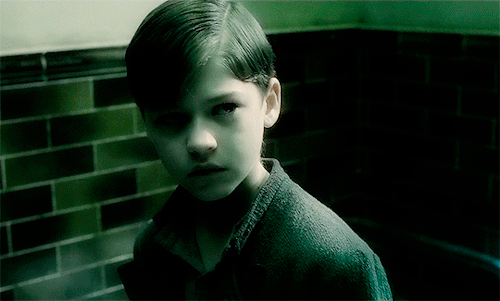
His face is lit the exact same was as Coulson’s was in COS (half-light, half-dark), and I said I was going to talk about this in Part 3. I think perhaps it's intended to make Fiennes-Tiffin look more evil or menacing, but I'm going to quite deliberately misinterpret it.
Now, for some context, Dumbledore has just (kind of) burned his wardrobe, ratted out his stealing habit, and (in the books only, they really took a pair of scissors to this scene) told him he needs to go apologize and return everything and Dumbledore will know if he doesn't, and, well, Tom's not exactly a happy bugger about it.
But interestingly, in the books, this is when we start to see Tom's 'persona,' aka his mask, start to come into play. Whereas before, he was screaming, howling, and generally freaking out, here, he starts to hide his emotions -- in essence, obscure his true self under a shadow. So this scene is really the reverse of Coulson's in COS.
And perhaps I'm reading wayyy too much into this, but I can't help but notice that Coulson's hair is parted opposite to Fiennes-Tiffin's, and the opposite sides of their faces are shadowed, too.
Riddle threw Dumbledore a long, clear, calculating look. "Yes, I suppose so, sir," he said finally, in an expressionless voice.
Riddle did not look remotely abashed; he was still staring coldly and appraisingly at Dumbledore. At last he said in a colorless voice, "Yes, sir."
Here's an article from The Atlantic on Romanian orphanages in the 1980s, when the dictator, Ceausescu, basically forced people to have as many children as possible and funnel them into institutionalized 'childcare', and it's absolutely heartbreaking.
There's not a whole lot of information out there on British orphanages in the 30s' and 40s', but given that people back then thought you just had to keep children on a strict schedule and feed them, it wouldn't have a whole lot better.
The only thing I've found is this, and it's not super promising.
The most important study informing the criteria for contemporary nosologies, was a study by Barbara Tizard and her colleagues of young children being raised in residential nurseries in London (Tizard, 1977). These nurseries had lower child to caregiver ratios than many previous studies of institutionalized children. Also, the children were raised in mixed aged groups and had adequate books and toys available. Nevertheless, caregivers were explicitly discouraged from forming attachments to the children in their care.
Here's a fairly recent paper that I think gives a good summary: Link
Here, they describe the responses to the Strange Situation test (which tests a child's attachment to their caregiver).
We found that 100% of the community sample received a score of “5,” indicating fully formed attachments, whereas only 3% of the infants living in institutions demonstrated fully formed attachments. The remaining 97% showed absent, incomplete, or odd and abnormal attachment behaviors.
Bowlby and Ainsworth, who did the initial study, thought that children would always attach to their caregivers, regardless of neglect or abuse. But some infants don't attach (discussed along with RAD in Part 2).
Here's a really good review paper on attachment disorders in currently or formerly institutionalized children : Link
Core features of RAD in young children include the absence of focused attachment behaviors directed towards a preferred caregiver, failure to seek and respond to comforting when distressed, reduced social and emotional reciprocity, and disturbances of emotion regulation, including reduced positive affect and unexplained fearfulness or irritability.
Which all sounds a lot like Tom in this scene. The paper also discusses neurological effects, like atypical EEG power distribution (aka brain waves), which can correlate with 'indiscriminate' behavior and poor inhibitory control; which makes sense for a kid who, oh, I don't know, hung another kid's rabbit because they were angry.
Furthermore...
...those children with more prolonged institutional rearing showed reduced amygdala discrimination and more indiscriminate behavior.
This again, makes a ton of sense for Tom's psychological profile, because the amygdala (which is part of the limbic system, which regulates emotions) plays a major role in fear, anger, anxiety, and aggression, especially with respect to learning, motivation and memory.
So, I agree completely that Tom needed a lot of help, especially given the fact that he spent eleven years in an orphanage (longer than the Bucharest study I was referring to), and Dumbledore wasn't exactly understanding of his situation, and probably didn't realise what a dramatic effect the orphanage had on Tom, and given the way he talks to Tom, probably treated him as if he were a kid who grew up in a healthy environment.
In case you are still unconvinced that hugging is that important, there's a famous 1944 study conducted on 40 newborn human infants to see what would happen if their physical needs (fed, bathed, diapers changed) were provided for with no affection. The study had to be stopped because half the babies died after four months. Affection leads to the production of hormones and boosts the immune system, which increases survival, and that is why we hug children and babies should not be in orphanages. They are supposed to be hugged, all the time. I can't find the citation right now, I'll add it later if I find it.
But I think it's vastly unrealistic to say that Dumbledore, who grew up during the Victorian Era, would have any grasp of this and I don't think he was actively malicious towards Tom.
Was Tom Riddle failed by institutional childcare? Absolutely.
Were the adults in his life oblivious to his situation? Probably.
Do the shitty things that happened to Tom excuse the murders he committed, and are they anyone's fault but his own? No. At the end of the day, Tom made all the wrong choices.
And, for what it's worth, I think (film) Dumbledore (although he expresses the same sentiment in more words in the books) wishes he could go back in time and have helped Tom.
"Draco. Years ago, I knew a boy, who made all the wrong choices. Please, let me help you."
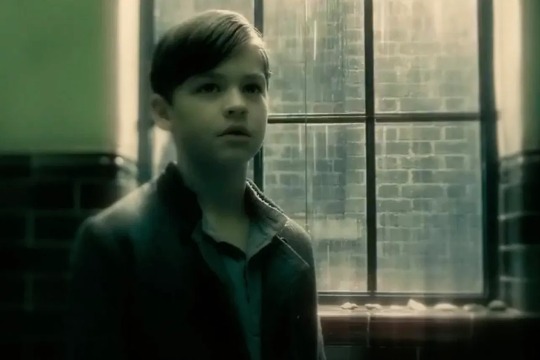
#tom riddle#the many faces of#tom marvolo riddle#character analysis#character study#albus dumbledore
144 notes
·
View notes
Note
Just wanted to say thank you so much for all the brainworms you have been giving me and my friends for the past few hours about Ayin and all the analyses you've been doing about him.
I have been losing my mind in the middle of the night thinking about all the things you've said, turning it over like crazy and trying to compare it with the gameplay I've had of Lobotomy Corporation and Library of Ruina.
Please do more analysis and share more of your ideas! Please? Please, with cherry on top? Please, I beg of you?
Especially if you have in-depth ideas of analyses for the Sephirah and how it relates to both their own characters and Ayin and Angela.
I thank you greatly in advance!
the implication that i've infected an entire friend group with my brainworms is power that will 100% go to my head i feel amazing. what else is analysis posting except trying to inflict people with the same thoughts bouncing around your skull on repeat
i DO have shit on the sephirah but mostly netzach, because i love netzach, and i in fact found my discord ramble about him (and chesed)
i dont have things on how they relate to A and Angela specifically because I mainly kept thinking abt Reverbaration Ensemble parallels... i have so many thoughs abt Netzach and Bremen.
(but if you want me to talk about, say, a specific core supression, or floor realization... i have a lot of thoughts on floor realizations.)
First off I am so sorry that you seem to think I'm smart because that means i have the perfect opportunity to inflict you with this

okay now we can get to the serious stuff
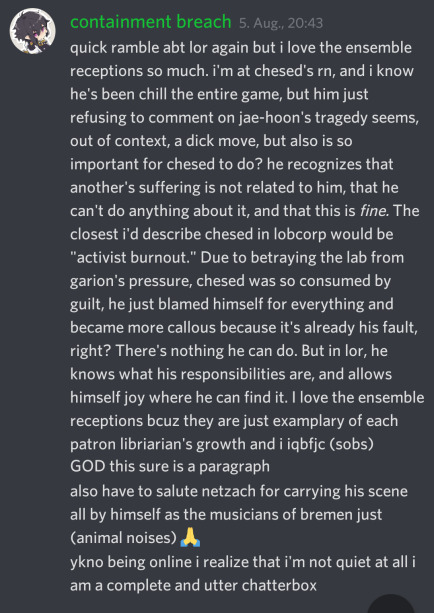
[transcript:
containment breach:
quick ramble abt lor again but i love the ensemble receptions so much. i'm at chesed's rn, and i know he's been chill the entire game, but him just refusing to comment on jae-hoon's tragedy seems, out of context, a dick move, but also is so important for chesed to do? he recognizes that another's suffering is not related to him, that he can't do anything about it, and that this is fine. The closest i'd describe chesed in lobcorp would be "activist burnout." Due to betraying the lab from garion's pressure, chesed was so consumed by guilt, he just blamed himself for everything and became more callous because it's already his fault, right? There's nothing he can do. But in lor, he knows what his responsibilities are, and allows himself joy where he can find it. I love the ensemble receptions bcuz they are just examplary of each patron libriarian's growth and i iqbfjc (sobs)
GOD this sure is a paragraph
also have to salute netzach for carrying his scene all by himself as the musicians of bremen just (animal noises) :pray:
ykno being online i realize that i'm not quiet at all i am a complete and utter chatterbox /end]
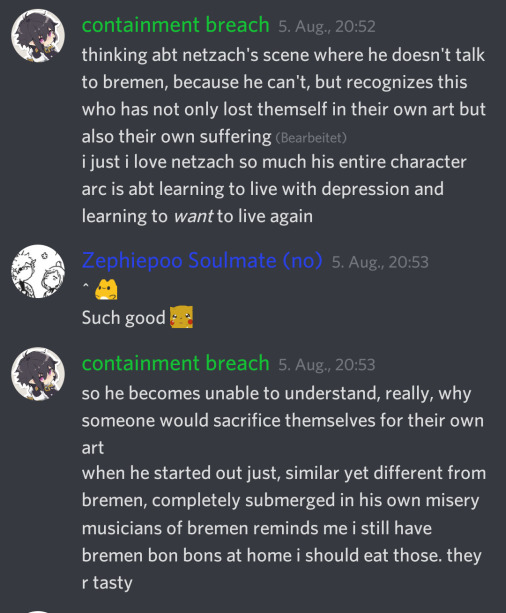
[transcript:
containment breach:
thinking abt netzach's scene where he doesn't talk to bremen, because he can't, but recognizes this who has not only lost themself in their own art but also their own suffering
i just i love netzach so much his entire character arc is abt learning to live with depression and learning to want to live again
so he becomes unable to understand, really, why someone would sacrifice themselves for their own art
when he started out just, similar yet different from bremen, completely submerged in his own misery
musicians of bremen reminds me i still have bremen bon bons at home i should eat those. they r tasty /end]
i wanna specifically dig into this scene more because i love that scene, a lot.
Art as we get to know it in the City is irrevocably tied to violence. Puppets are made of human bodies, music is played on bones and sinews. To the artists of the City, to create art is to make someone suffer. Rewatching Netzach's story bits, Roland describes it as doing nothing but seeking stimulation and being provocative.
Furthermore, there is a direct comparison between art and alcohol. To paraphrase more, the Pianist must've been one hell of a stimulant, like getting hit by a strong booze. A performance some are still hungover from.
Netzach's main struggle was addiction because of depression, and his growing appreciation for art is a continuation of that arc. He says himself that art and alcohol are linked.
However, alcohol is a step down from hard drugs. Netzach hasn't quit, but just that step down shows he learned moderation, which makes me very proud of him.
Moderation is what the other.. let's just call them artists, lack. I said in the screencaps above, initially, Netzach was lost in his own suffering, and the musicians of bremen are lost in their art. And if art is seen as equal to suffering, that just means Netzach and Bremen are more similar than expected. (Especially considering what we see of the musicians previously; they’re always trying to chase the same high they experienced listening to the Pianist by any means necessary. The addiction parallels are not suprising.)
I rewatched most of Netzach's lor scenes, and what rlly gets me is that in his first one, he seems almost the exact same as in lobcorp. He doesn't want to work, he got dragged into this against his will, he feels as if his accomplishments are futile.
But! He eventually invites Roland for drinks. He's not drinking to forget alone anymore, he's doing it as social activity. Furthermore, the more time he spends as Patron Librarian of Arts, the more he grows to appreciate art. Art is tied to suffering, still, but it is an expression of suffering. It does not produce any. Or should not, in any case. He sure wishes it wouldn’t.
So we arrive at his Ensemble Reception. This one makes a rather interesting comparison: art as the pursuit of the light. Let me elaborate.
To quote, “Honestly, I wanna tell people to stop doing the kind of art that requires ‘em to immolate themselves and others. Although, on the other hand... I can kinda see where they’re coming from. Art narrows your vision, after all.
You stop caring about the things around you. That’s how most artists seem to act, I think. And so, you indulge in the craft, not realizing that you’re throwing yourself and your surroundings into the fire you started.”
I pose this: Netzach speaks of his experience as Giovanni. Giovanni was a researcher who, when push came to shove, willingly sacrificed himself to advance the project, in hopes of seeing the light, seeing Carmen, again.
Though he dislikes Bremen’s actions, he does not judge them for it, because he recognized that it would be hypocritical. Even so, what shows that he’s grown is that he.. doesn’t want to see people harm themselves anymore. The focus here isn’t if Bremen hurt other people, which they have, but how much of themselves they’ve given up for their performance. He condemns the act, and not the people.
“If I can see that light once more... If I have to muster up the courage to reach it, I’ll gladly do it. It’s easier said than done, though; you need a lot of fearlessness for it.
And I guess you saw the same kind of light I was so desperate to see, yeah? Even if yours was a twisted creature... [...] Though, I don’t think I can tell you off like the others. At least I can see the reason behind it.”
He even explicitly mentions the light. The funny thing is, both Giovanni and Bremen tried to reach the Seed of Light, and Carmen. It’s tragically hilarious that we know Carmen is the voice the Distortions hear.
Hell, the more I think about it, the more you can just compare the Ensemble as a whole to the Outskirts Lab crew, down to Angelica’s puppet body and Carmen’s desecrated corpse.
“And I know pretty well that we have no right to devilishly pick apart each other’s way of art. I’m not very proud of mine, really...”
Netzach just.. gets it. I can’t remember atm, but I don’t think the other Patron Librarians really draw parallels like that. I’m seeing all the parallels now and I can’t unsee them ever. Bro.
His “art,” his way of protecting the light, is still violent. But he sees that perhaps it didn’t have to be, or rather shouldn’t be. I fucking love Netzach so much. His arc just means a lot to me personally, and I’d wager a lot of people who’ve struggled with mental illness would agree.
I’m not gonna get into Netzach’s floor realization here because this post is already long enough, but like, look at the specific flashback of Angela shown in Netzach’s story bits and contrast it to his arc of learning to want to live, and. Yeah.
#Feli gets asked#lobotomy corporation#library of ruina#netzach#NETZACH MY MAN NETZACH.#long post#this took a while to make cuz i got distracted many times by playing video games#also i'm not sorry for the first bit. know it in your heart. i'm right.
26 notes
·
View notes
Note
Hello! I'm curious to know your opinion. I've been working on this long fic for months. Ever since I started writing there has been a bunch of anon's under different names telling me how to write each chapter. Saying things like "make (A) do this", "(b) needs to do that." "I expect this to happen to (C)" Etc. On one hand I'm grateful for the feedback, after all what writer isn't, but of 10 comments, 9 are like this. I'm starting to feel my writing isn't good enough for my readers.
Hello anon! Elizabeth here. Hooooo boy let me tell you, as I was reading this I went on a **journey**. When I reached “9 out of 10,” I went, “WHAT.” I have a few thoughts, and without knowing the full context (what your story is like, what fandom it’s in, etc etc) some of this might apply and some might not. But I think it’s all generally useful for fic writers and readers to think about.
This actually got pretty long, so I’ll put my thoughts under a cut.
1) The story vs reader expectations
This is something I think about—and talk about—a lot. Here’s a bit of what I said while discussing what “OOC” actually means a few episodes back:
Humans act irrationally, and I think that you can write a character acting irrationally well. But to me, that’s not a character acting out of character. That’s a character acting against character, irrationally... I think when we say “out of character” about characters we’re actually saying something different, which is: “Have you done the work to show why the character would respond to this situation X way or Y way?” And if he responds Z way, and you haven’t done any of the work to show why he might do that or any of the consequences if it is truly out of character the way we would say a real human acts out of character—then very often it is bad writing. It is people taking plot ideas and then imposing them over their characters without earning it.
These conversations are a huge part of our discussions about media in recent years—whether writing choices are good, whether they are earned, whether they are “in character,” whether they conform to what we expected. But the last one is where things get really murky—because there are *a lot* of readers and viewers these days who are kind of doing what I’m accusing bad writers of doing in that quote—imposing their expectations over the story without really grasping what’s been set up by the writer(s).
There are a lot of parts to this. We often pinpoint Lost as the place where the modern audience’s inclination to “solve” a show was born, and this has spread throughout viewing/reading cultures over the past two decades. The rise of “spoiler culture” is a huge factor here, too—as if knowing plot points is the only thing of value when viewing or reading a piece of entertainment. My least favorite thing in all of this is TV Tropes and the kind of rewiring of peoples’ brains to *only* look for those concepts (which are often weirdly narrow and reductive, unlike, say, the more categorical tropes of fic or the romance genre).
Here’s an example: in 2017, Gav and I made our love of Black Sails the centerpiece of our fandom newsletter, The Rec Center, and in the process got a lot of people to watch it. And because we were the ones that inspired them, I had a fair number of people in my mentions/messaging me to give their real-time reactions as they went through the episodes.
While not every single writing choice on Black Sails is flawless, much of it is meticulously done, and so many of the plot points are carefully well-earned. But the things people were guessing would happen next in my mentions...were bonkers. Not everyone! But it was enough people (guessing different things) that I was kind of floored. I would think, If that’s what you think is going to happen next, I feel like you aren’t paying attention to the show? I should clarify that this happened with *a lot* of people, not trying to call anyone in particular out. But so many of the guesses felt like they came from expectations imposed by other media, especially stuff that’s signficantly more formulaic and tropey.
This instinct—to predict, to vocally desire outcomes, to try and get ahead of the writers, to impose the structures of other media over the thing you’re watching—is *deep* in a lot of viewers’ and readers’ minds these days, and it comes out regardless of the quality of the writing. I think it’s not a great turn of events, to be honest—and it leads writers to make some really foolish choices in an attempt to “trick” viewers with something they never could’ve guessed. Which...generally makes for bad writing overall.
2) Expectations within your fic
So this is the part where I falter a bit without context. Because some fic writers make it clear that they are posting as they write, and that they’re open to suggestions for plot choices. I assume you haven’t done this, or you wouldn’t be unhappy that people are trying to dictate what comes next.
I’m curious if you are signalling that you’re...OK? with these kinds of comments by, say, writing nice replies that don’t make it clear that you know where you’re going with the story and you’ve already made choices about what happens next. There’s definitely a way to strike that balance, like a very polite evasion, something like, “Haha, thanks for the comment! I have the whole fic plotted out, so you’ll just have to wait and see!” If you start to signal that you’re in control of the plot, not the commenters, perhaps they’ll chill out a bit—because I gotta be honest, the fact that this is 90% of the comments...is wild to me. And I’m wondering if people are doing it because they see other people doing it.
Again, total speculation without any actual context. I think that this sort of thing is likely more common in certain fandoms and with certain age groups. Even on AO3, fandom is not a monolith—I wonder if you’ve noticed this with other longfics in your fandom. It might be worth checking out how other writers have handled it, if they’re getting flooded with comments like these.
I posted a longish fic recently, 75K over the course of three months, and let me tell you, no offense to any of my commenters, but a few of them reminded me of those Black Sails folks: What story are you actually reading?? I politely pushed back with one who asserted a whole bunch of stuff that was not in the story at all and tried to predict what would happen based on what was frankly bad reading comprehension. With others who expressed expectations about where things would go, I went the, “Haha you’ll have to wait and see!” route.
Talking to other people who’ve posted chapter-by-chapter longfics, I know that some of the bad predictions are par for the course: being absolutely certain the trouble in a section won’t be resolved, being convinced that any hint that the ship may not stay together will come to pass, even when, what, 95% of all shippy fic has the characters staying together? There’s a sort of performativity of immediate reactions in fic commenting, “OH NO, OH NO, ARE THEY BREAKING UP?” Like, duh, not forever. But commenting as real-time reaction is clearly the way a lot of readers engage with fic. Which is fine! That’s different from dictating the plot to you.
3) The commenters vs your story
OK, so conceptually swinging back to the first bit, while my immediate response to, “I'm starting to feel my writing isn't good enough for my readers,” is NO NO NO JUST BECAUSE AN AUDIENCE IS SAYING SOMETHING DOESN’T MEAN YOU ARE BAD AND THEY ARE CORRECT. But! I think it might be worth spending a liiiitttle bit of time with them to see what they are saying, and how you think that connects back to what you’ve written.
When folks came at me with, “I think X will happen next in Black Sails,” I, as a person who’s watched it several times and also professionally deconstructs texts as a critic, can go through and be like, “Here’s why I think that’s a misreading of what you’ve seen so far” (though mostly I would just say things like, “Why try to predict the plot! Just enjoy it!” because I’m trying not to be a dick). Rewatching the show, I can see all the things the writers carefully laid out, and how they pay off eventually. Can I imagine alternate choices for the characters? Sure! But I can see why, with the specific context and stakes in which characters made decisions, the writers had them do what they did. If they made other choices, I’d want that similar sort of work-showing.
Similarly, when I got the occasional comment like this on the aforementioned fic, I would take it seriously for a moment. Why are they predicting this? Is it possible I haven’t shown my work enough? As I was writing, I thought very carefully about the characters and their motivations and the way certain events shaped their choices, and how changing events would change those choices. Generally, those comments felt, well, unearned: they were more about the reader than about the actual story.
It helped having a beta who is both smart and scary, and wouldn’t hesitate to tell me if something wasn’t working. A big issue with the “no feedback in fanfic” convo is decontextualized “feedback” from random readers is not really useful! You have people coming from all sorts of backgrounds, all levels of reading comprehension, all sorts of contexts. Everyone can give you their *reaction* to your work, of course, but without that context of critique—the thing you have with a beta/editor, or if you’re in a writing workshop or group—it’s rare that some rando can give you truly useful feedback.
But! That brings me back to 9 out of 10. I think, with that many people weighing in, it’s worth doing a little bit of serious consideration. Just read back over the story. If you can see ways that you zigged when you were signalling that you were going to zag, then your commenters might have a point. If they’re guessing character X might do Y next, and you’ve planned to have him do Z but actually haven’t done the legwork to make Z seem like a sensible next step, then that might be a fair read. Especially when they say, “I expect X will do Y,” try to figure out to the root of that expectation. Is this about the story, or is it about them?
Because no audience is some neutral set of readers, and fandom even less so. People might tell you to do something because they hate one character and love another. People might hate your ship and for some reason are choosing to read it anyway. People have a million different contexts they bring to reading a work and not infrequently, they are reading through sets of expectations formed by other pieces of media that have very little to do with your own.
4) tl;dr
The ~wisdom~ of the crowd is not inherently greater than the wisdom of the writer. Many people in fandom are very thoughtful readers—probably some of the most thoughtful readers out there! But plenty...are not. And that’s fine! They’re obviously still free to comment. I’d love to say, “ignore them, write for yourself, you’re writing the story you wanna write,” but I know how frustrating this must be for you. So give them a little consideration, but not too much. And most importantly, if you have a beta, ask them their opinion of these comments—and if you don’t have a beta, get one! Because a reader you know and whose opinions you trust is so much more valuable than random anon comments, no matter the circumstances.
66 notes
·
View notes